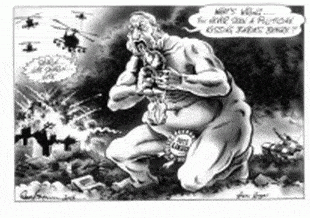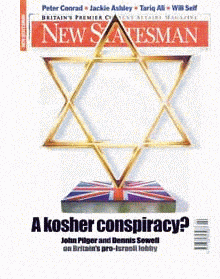The comprehensive report of the All-Party Parliamentary Inquiry into Anti-Semitism in the UK has been published. The aims of the inquiry were:

- To consider evidence on the nature of contemporary anti-Semitism;
- To evaluate current efforts to confront it;
- To consider further measures that might usefully be introduced.
Specifically regarding the role of the media in the rise of anti-Semitism, the inquiry concluded:
The spread of antisemitism on the internet and in the media is a problem with wider ramifications for society. In the modern world of instant globalised news and interactive opinion, the media has a responsibility to present a fair and balanced picture of world events and not to use inciteful or irresponsible language, the effect of which is to increase tensions between Britain’s minority communities.
The report states that a “legitimate opinion on the political decisions of the Israeli state may be expressed in an antisemitic manner, even if its author did not intend it to be, if it uses phrases and imagery which tap into antisemitic discourse”, and refers to the New Statesman’s infamous January 2002 “Kosher Conspiracy” front cover. The report states that:
What matters more than the subject of the article is the way in which it was illustrated by anti-Semitic imagery that would have been unacceptable twenty years ago. This implies a decline in awareness of Jewish racial stereotypes and the boundaries of acceptable public discourse.
Also mentioned is the 2003 Independent cartoon of Ariel Sharon devouring a baby, an example of when the “intention of the author may not be antisemitic for the piece to have anti-Semitic themes.”

The report concludes:HonestReporting UK wishes to state clearly its belief that rational criticism of Israel is perfectly legitimate and we take issue with those who charge that pointing out anti-Semitism in the media, whether intentional or not, is a means to silence debate on Israel’s policies or actions.
that a discussion needs to take place within the media on the impact of language and imagery in current discourse on Judaism, anti-Zionism and Israel and we call upon them to show sensitivity and balance in their reporting of international events and recognise that the way in which they report the news has significant consequences on the interaction between communities in Britain.
Writing on the Guardian’s Comment is Free blog site, inquiry panel chair Denis MacShane MP asks “why was the Guardian’s coverage of our report quite as titchy as it was? The other broadsheets gave it full whack but it was a surprise to me that the Guardian reduced an important report based on a year’s parliamentary work to a tiny news story.” Indeed, a glance at some of the vicious comments posted in response to MacShane’s article is convincing enough evidence of the negative contribution of media outlets such as the Guardian to the prevailing atmosphere.
Melanie Phillips, reacting to the report, states that the “media in Britain bear a heavy responsibility for perpetrating these libels and thus creating hatred of both the Jewish state and the Jews.” Referring to the “Kosher Conspiracy” front cover, Phillips takes issue with the report’s analysis, arguing that:
this does not imply a decline in awareness of a Jewish racial stereotype so much as a belief in that Jewish racial stereotype. The Statesman ran the image of the Star of David impaling a UK Union flag because it perfectly expressed its view that there might be a Jewish conspiracy against British interests. The media use the iconography of classical antisemitism because it fits their prejudices.
HonestReporting UK recommends that subscribers read the Parliamentary Inquiry’s report in full to examine the issue of anti-Semitism in Britain today.
BBC LOSES BALEN CASE

Back in November 2003, Malcolm Balen was appointed by the BBC as a “senior editorial advisor” to improve Mideast coverage. According to Ha’aretz, Balen was to issue an internal report to BBC executives. Balen, however, disappeared from view and his report was buried in the vaults of White City despite numerous requests from outside organisations to view its contents.
One London solicitor persevered and a tribunal has now ruled that the BBC was wrong to deny access to the Balen Report, opening the way for many other previous requests to be resubmitted. There are many people who would be very interested to see Balen’s conclusions regarding the BBC’s treatment of the Israeli-Palestinian conflict. HonestReporting UK will now submit its own request to the BBC for access to the Balen Report.
To ensure that our request is on behalf of as many people as possible, please refer e-mail to friends and family to HonestReporting UK and encourage them to subscribe.
to media bias.



